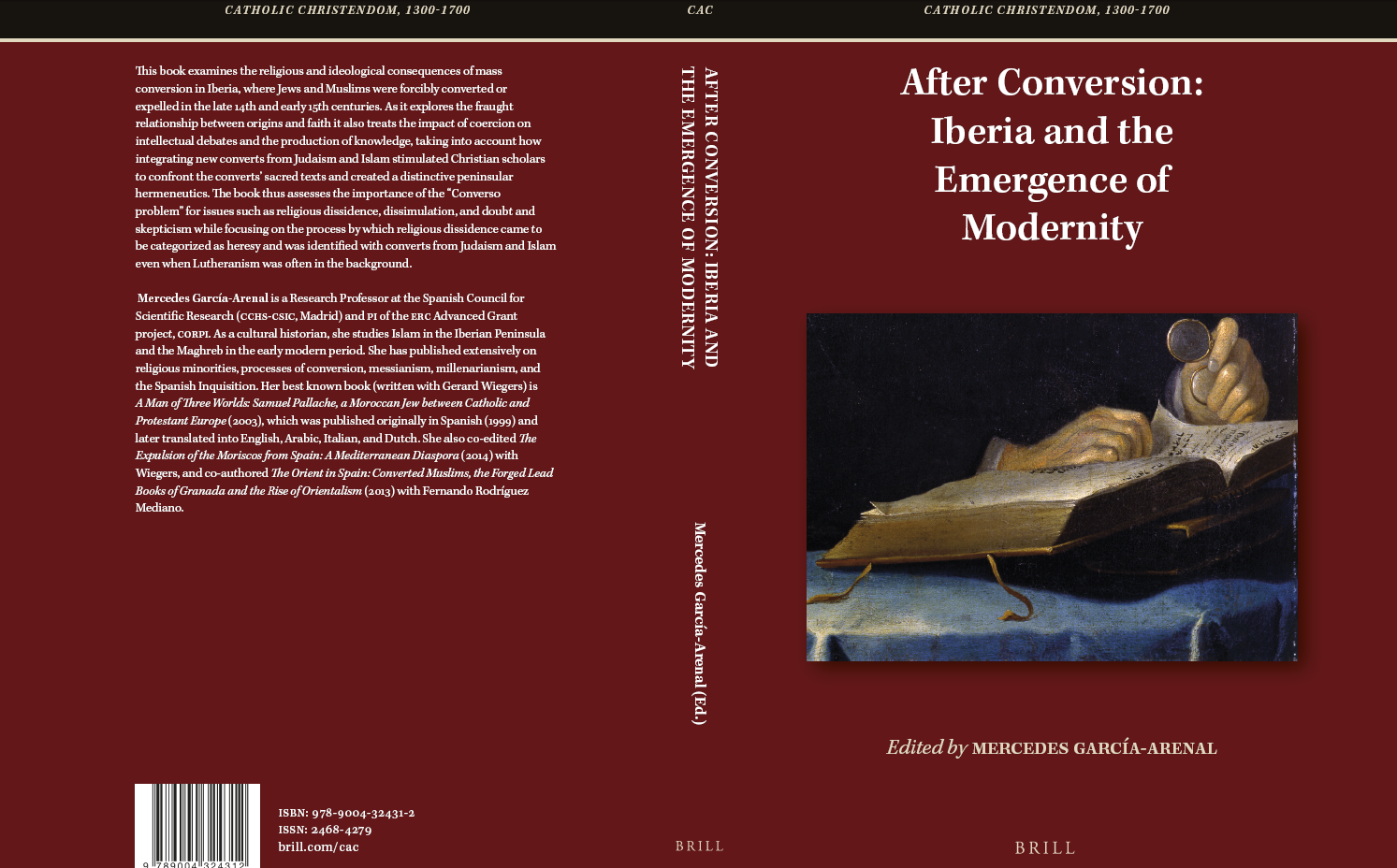
After Conversion: Iberia and the Emergence of Modernity.
Edited by Mercedes García-Arenal (Leiden: Brill, 2016).
This book examines the religious and ideological consequences of mass conversion in Iberia, where Jews and Muslims were forcibly converted or expelled at the end of the XVth century and beginning of the XVIth, and in this way it explores the fraught relationship between origins and faith. It treats also of the consequences of coercion on intellectual debates and the production of knowledge, taking into account how integrating new converts from Judaism and Islam stimulated Christian scholars to confront the converts’ sacred texts and created a distinctive peninsular hermeneutics. The book thus assesses the importance of the “Converso problem” in issues such as religious dissidence, dissimulation, and doubt and skepticism while establishing the process by which religious dissidence came to be categorized as heresy and was identied with converts from Judaism and Islam even when Lutheranism was often in the background.
***
This book is based on papers delivered on three panels, with the general title of Conversion and its Intellectual Consequences in Early Modern Iberia, at the meeting of the Renaissance Society of America held in New York in March 2014. Four scholars, including a discussant, took part in each of the three panels. The aim of these panels was to give members of the CORPI project (ERC Grant Agreement number 323316), whose PI is Mercedes García-Arenal, the opportunity to present their work and discuss it with American colleagues before an international audience. It was also an opportunity for senior scholars to engage in dialogue with early stage researchers. In addition to the papers given on these panels (Kimmel, Rodríguez Mediano, Beaver, Tommasino, Wiegers, Szpiech, Pastore, García-Arenal, Pereda), this volume contains a further two papers (Vincent-Cassy and López Fadul) presented on other panels at the same meeting of the RSA that have clear affinities with our own work. Finally, two more contributions by CORPI members (Soto and Starczewska, Fowler) were added to round out the thematic issues presented and discussed at the RSA.
***
Preliminary Material pp.: i–xii
Introduction (Mercedes García-Arenal) pp.: 1–19
1 Nebuchadnezzar’s Jewish Legions: Sephardic Legends’ Journey from Biblical Polemic to Humanist History (Adam G. Beaver) pp.: 21–65
2 Biblical Translations and Literalness in Early Modern Spain (Fernando Rodríguez Mediano) pp.: 66–94
3 Language as Archive: Etymologies and the Remote History of Spain (Valeria López Fadul) pp.: 95–125
4 The Search for Evidence: The Relics of Martyred Saints and Their Worship in Cordoba after the Council of Trent (Cécile Vincent-Cassy) pp.: 126–153
5 Textual Agnogenesis and the Polysemy of the Reader: Early Modern European Readings of Qurʾānic Embryology (Pier Mattia Tommasino) pp.: 155–173
6 A Witness of Their Own Nation: On the Influence of Juan Andrés (Ryan Szpiech) pp.: 174–198
7 Authority, Philology and Conversion under the Aegis of Martín García (Teresa Soto and Katarzyna K. Starczewska) pp.: 199–228
8 Polemical Transfers: Iberian Muslim Polemics and Their Impact in Northern Europe in the Seventeenth Century (Gerad A. Wiegers) pp.: 229–249
9 Assembling Alumbradismo: The Evolution of a Heretical Construct (Jessica J. Fowler) pp.: 251–282
10 Doubt in Fifteenth-Century Iberia (Stefania Pastore) pp.: 283–303
11 Mi padre moro, yo moro: The Inheritance of Belief in Early Modern Iberia (Mercedes García-Arenal) pp.: 304–335
12 Tropes of Expertise and Converso Unbelief: Huarte de San Juan’s History of Medicine (Seth Kimmel) pp.: 336–357
13 True Painting and the Challenge of Hypocrisy (Felipe Pereda) pp.: 358–394
Printed Sources and Bibliography pp.: 395–450
Index pp.: 451–461